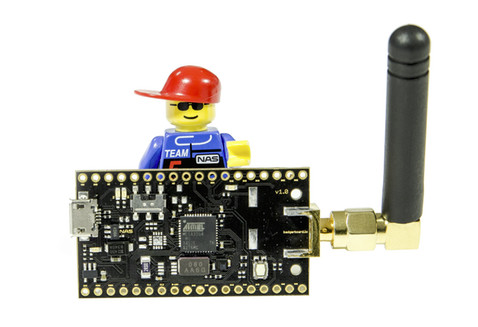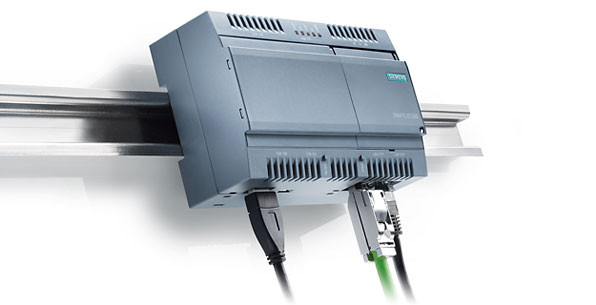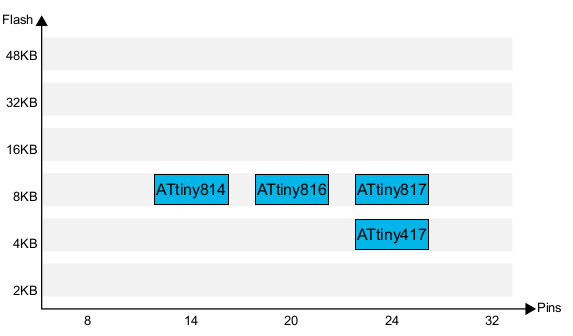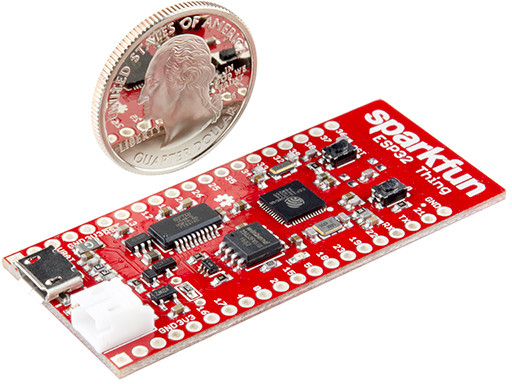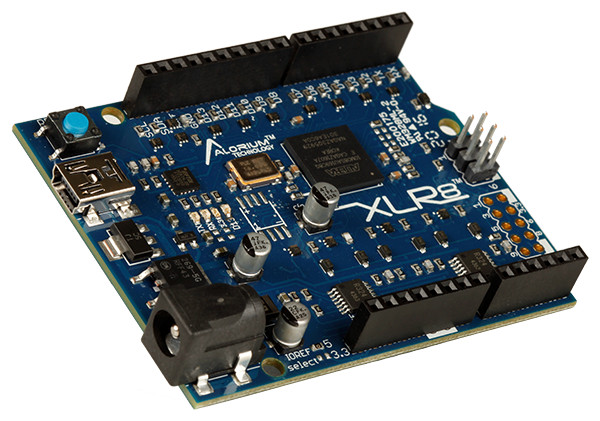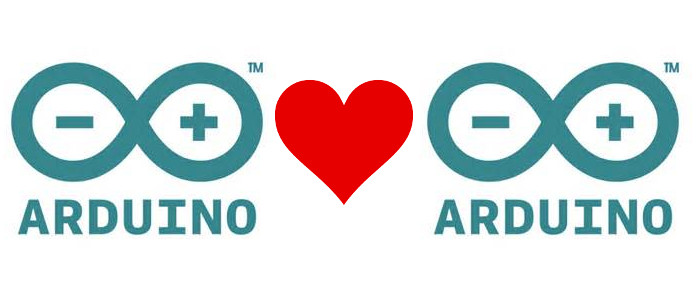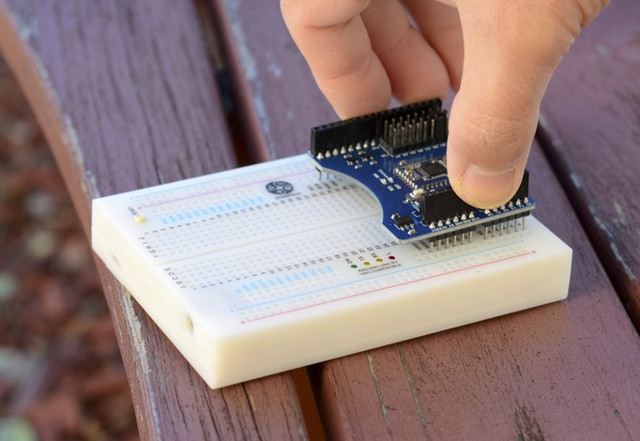Here comes one more LoRa board to play with. Badgerboard combines an Arduino compatible Atmel/Microchip AVR MCU with a Microchip RN2483 or RN2903 module in a breadboard compatible board powered via micro USB port or an external battery. Badgerboard specifications: MCU – Atmel ATmega32U4 MCU Connectivity – LoRaWAN via Microchip RN2483 (EU – 868MHz) / RN2903 (US – 915 MHz) modem with SMA connector and antenna USB – 1x micro USB port for power and programming Expansion – 2x 18-pin unpopulated headers with SPI, I2C, 13x GPIOs, 6x 10-bit ADC, 3.3V and GND signals; open drain output for relays up to 24V 100 mA Sensors – STM HTS221 temperature and humidity sensor Misc – Reset button; user and Tx/Rx LEDs; power on/off switch Power Supply – 5V via micro USB port, or Li-Ion/ Li-Po battery via JST connector Dimensions – 56 x 26 mm The board can be programmed with […]
Siemens SIMATIC IOT2000 UL Approved Educational & Industrial IoT Gateways are Powered by Intel Quark Processor
Siemens has recently released SIMATIC IOT2000 series IoT gateways based on Intel Quark X1000/X1020 processor also used in Intel Galileo Gen 2 board with both IOT2020 educational version, and IOT2040 industrial version featuring UL-approval, Arduino headers, and a mini PCIe expansion socket. SIMATIC IOT2040 specifications: SoC – Intel Quark X1020 32-bit processor @ up to 400 MHz with 16KB cache (2.2W TDP) System Memory – 1 GB RAM Storage – micro SD slot Connectivity – 2x Ethernet ports Serial – 2x RS232/485 interfaces USB – 1x USB 2.0 port, 1x micro USB device port Expansion – Arduino UNO compatible headers, mini PCIe socket Misc – Battery-backed RTC Power Supply – 9 to 36V DC wide-range power supply Dimensions – 144x90x54 mm Weight – About 200 grams Temperature Range – 0 °C to up to +50 °C Certificates – CE, UL, FCC, KCC, RCM The device support wall-mount and DIN rail […]
Microchip Atmel ATtiny417/814/816/817 tinyAVR MCUs Include Core Independent Peripherals (CIPs)
Microchip’s latest Atmel tinyAVR MCUs combine Atmel 8-bit AVR core with CIPS (Core Independent Peripherals) normally found in the company’s PIC MCUs. Since Atmel’s purchase by Microchip, I believe this is the first time the company leverages features from both MCU families. The four new ATtiny MCUs come with 4 to 8 KB flash, and up to 24 pins: ATtiny417 – 8-bit Atmel AVR MCU with 4KB Flash, 256 bytes SRAM, 128 bytes EEPROM, 20MHz/20 MIPS, two 16-bit timer/counters, one 12-bit timer/counter, RTC, USART, SPI, Two-wire Interface (I2C), 10-bit ADC, 8-bit DAC, analog comparator, accurate internal oscillators and multiple calibrated voltage references, Custom Logic, 10-bytes unique ID, and 24 pins ATtiny814 – Same as above but with 8KB flash, 512 bytes SRAM, Peripheral Touch Controll (PTC), and 14 pins ATtiny816 – Same key features as ATtiny814 but with a 20-pin package with more I/Os ATtiny817 – Same key features as […]
Marvin is a Plug and Play, Arduino Compatible, LoRa USB IoT Development Board (Crowdfunding)
LoRa appears to be one of the most popular LPWAN standards so far, with hobbyist development boards such as LoPy or LoRaONE, and we’ll soon have at least one more choice thanks to Marvin, a LoRa development board with a full size USB port. Marvin board specifications: MCU – Atmel/Microchip ATmega32u AVR MCU (same as Arduino Leonardo board) Connectivity – LoRa via Microchip RN2483; Supports both 868 MHz and 433 MHz frequency bands, on-board antenna USB – 1x USB, 1x micro USB port for power and programming Debugging – USB, and ISP header Expansion – 5x Grove connectors Power Supply – 5V via USB port Dimensions – N/A, but similar to USB flash drive The board can be programmed with the Arduino IDE, and they mention IBM Bluemix platform, and Node-RED, but overall details about documentation and software are scarce right now. One of the advantage of this form factor is […]
ESP32 Updates – ESP32-S Module Replaces ESP3212, ESP32 DevBoards for Sale, Arduino & NodeMCU Support
There have been some developments with regards to Espressif ESP32 in the last month since my post about upcoming ESP32 development boards. First ESP3212 module is no more, and has been replaced with ESP32-S module with about the same features, but it’s not pin-to-pin compatible, so the new module won’t work with older breakout boards made for ESP3212. ESP32-S is now out of stock on Seeed Studio, but you’ll find it on IC Station, Banggood, and others shops. One good news is that it’s now easier to buy – or at least pre-order – ESP32 development boards, although stock may still be an issue, as the platform is very popular. If you live in the US, you can now backorder “Sparkfun ESP32 Thing” for $19.95. ESP32 board can be powered by either a micro USB power supply or a LiPo battery, and exposes close to 30 I/O pins. ESP32 developer […]
Alorium XLR8 Arduino Compatible Altera MAX 10 FPGA Board Sells for $75
We already have a fair choice of boards with Arduino compatible headers powered by an FPGA with options such as $99 Digilent Arty (Xilinx Artix-7 FPGA), FleaFPGA (Lattice FPGA), Papillio DUO (Xilinx Spartan 6), or Snickerdoodle + shieldBuddy (Xilinx Zynq-7010/20). There’s no yet another choice with Alorium Technology XLR8 Arduino UNO like board powered by Altera MAX10 FPGA. XLR8 board specifications: FPGA – Altera MAX 10 FPGA MCU – Atmel/Microchip ATmega328 8-bit MCU Digital I/Os 5V inputs, 3.3V outputs 14x Digital I/O Pins 6x PWM Digital I/O Pins 6x Analog Pins Analog Inputs 5V tolerant Op-amp circuit emulates 0-5V behavior of the ADCs on the Arduino UNO Performance: 1 MHz; Resolution: 12-bit sustained Sample Rate: 154k samples/second Power Supply – 5V via USB or barrel connector Dimensions – Arduino UNO form factor The board is supported by Altera Quartus Prime Lite Edition, and programmable either via JTAG though a USB […]
Arduino & Arduino Get Back Together Again
I don’t normally write about business news, unless they have a clear impact on the technical side of things. So for example, I did not write about NXP buying Freescale, Qualcomm likely buying NXP, Microchip buying Atmel, nor Softbank buying ARM. But the split between Arduino LLC (US – Arduino.cc) and Arduino SRL (Italia – Arduino.org) has had some clear impacts with both companies designing different boards, providing Arduino IDEs that may not be compatible with the competitor product, and in the case of Arduino LLC, they had to use the Genuino brand outside of the US. All those points may have brought confusion to some users. The goos news is that Arduino LLC and Arduino SRL will now merge together and become Arduino Holdings after signing a settlement agreement. This has announced at New York Maker Faire, and both Arduino.org and Arduino.cc blogs: At the end of 2016, the […]
Meet STEMTera Smart Breadboard with Built-in Arduino Board, and LEGO Compatibility (Crowdfunding)
From time to time, you see new products on the market with an idea that – in hindsights – seems to simple and obvious that it makes you wonder why you or others had not thought about it a long time ago. Most people will use an Arduino board with a breadboard for their project, so it makes perfect sense to combine both into a single product, and that’s exactly what STEMTera has done, when they designed a breadboard containing an Arduino compatible board, supporting Arduino UNO R3 shields, and usable with LEGO bricks. STEMTera breadboard specifications: MCU (Arduino) – Microchip/Atmel ATmega328P-AU MCU @ 16 MHz with 2KB SRAM, 32KB flash, and 1KB EEPROM MCU (USB-to-TTL) – Microchip/Atmel ATmega16U2 MCU @ 16 MHz with 512 bytes SRAM, 16KB flash, and 512 bytes EEPROM Expansion Arduino MCU – 14 digital I/Os (including 6 PWM), 6x analog input; 5V I/Os; DC current […]


